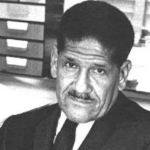I.
Sirs, in our youth you love the sight of us.
Older, you fall in love with what we’ve seen,
Would lose yourselves by living in our lives.
I’ll spin you tales, play the Arabian girl;
Working close, alone in the blond arena,
Flourish my cape, the cloth on the camera.
For women learn to be a holy show.
I’ll tell you where I’ve been, not what I am:
In Rotterdam, womb where my people sprang,
I find my face, my father, everywhere.
New cousins I must stoop to greet, the get
Of tall, whey-colored burghers, sturdy dams,
As children fed on tulip bulbs and dirt,
Tugged at dry dugs and sucked at winter’s rind.
My cousins, dwarfed by war! Your forms rebuke
The butcher and the bystander alike.
To ease you I can’t shrink this big Dutch frame
Got of more comfortable ancestors.
But from my Southern side I pluck a phrase,
“I’ll carry you.” And it means “rest in me,”
To hold you as I may, in my mind’s womb.
But snap the album, get the guidebook out!
Rotterdam: her raw, gray waterfront,
Zadkine’s memorial burning on the quay;
This bronze is mortal, gaping in defeat,
The form that wombed it split to let it be.
It mends; he lurches up, in blood reborn,
The empty heavens his eternal frame.
II.
Move to my room beside the Golden Horn
The architecture: breasts and phalluses.
Where are the words to say that words are lies?
Yeats lied. And here Byzantium lies dead.
Constantinople? Syllables in a text.
Istanbul. Real. Embalmed in dancing dust.
Everywhere the dark-brown past gives way
To the beige of progress, that wide vacant lot.
Turkey without coffee! Endlessly we sip tea
From bud vases, and I lust for the guide,
A sultry, serious, pedantic boy
In a tight brown suit, thirsting to get out
Of the triple city weighing on his mind.
Oh, he was doomed, doomed like the dogs
Netted and dumped and exiled, left to die,
Then skinned. We heard imaginary canine howls,
Like the rustlings of a thousand gauzy girls,
Film-eyed cattle, perishing of ennui
In abandoned harems where he guided me.
Meanwhile the Faithful, prostrate and intoning,
Stare into the light as blind as death,
Knowing for sure their end is instant heaven.
We Infidels concede them Paradise,
Having seen heaven-as-harem, a eunuch God
In charge: the virgin slowly fattening to blubber.
Love, become feminized, tickles like a feather.
The saints of Art? Sophia, that vast barn
Holds no small Savior waiting to get born.
The formal scribble on the assaulted walls—
Five hundred years of crossing out His name!
Some famous, glittering pebbles mark the place
As God’s most grandiose sarcophagus.
Decay, decay. And the mind, a fetus, dies.
III.
Return me to the airfield near Shanghai
Where I am very young: shy, apprehensive,
Seated like Sheba on a baggage mountain
Waiting for the first adventure to begin.
The train will glide through fields of rice and men,
Bodies like thongs, and glorious genitals,
Not alien as Chinese, but Adam-strange.
Rejoiced by her first look at naked men,
Her soul swims out the window of the train!
She goes where newborn daughters clog the creeks;
Bank-porticoes are strewn with starving rags.
Here the old dragon, China, thrashes, dying.
But the ancient, virile music of the race
Is rising, drenched in gongs and howls of dogs
Islanded, the sighs of walled-up women
Dreaming of peasants in their prisoning fields…
But we break out of the harem of history!
No longer that young foreigner on the train,
I listen like a bird, although I ruminate
Like a cow, in my pale Holland body, riven
By love and children. These eyes are what they see.
Come die with me in the mosques of Rotterdam.



















Comment form: